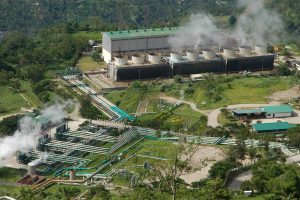
ORMOC CITY– The Energy Development Corporation (EDC) is constructing a new binary plant in Mahanagdong, this city to meet the increasing power demand in the Philippines.
This plant will complement EDC’s four existing geothermal power plants in the region.
Slated for inauguration in 2025, the binary plant will contribute an additional 28 megawatts (MW) to EDC’s power supply, bolstering the country’s energy grid.
Erwin Magallanes, corporate relations head of EDC Leyte, explained the significance of the new facility, stating that the ‘billion-peso binary plant harnesses geothermal brine—a process that utilizes working fluids from the geothermal reservoir before reinjecting them back into the ground.’
Magallanes highlighted that the plant will provide a stable electricity supply at a fixed rate, helping address the country’s growing demand for power.
He also noted that the binary technology, although not new, was an important investment for the Lopez-owned EDC due to its environmental benefits.
“Compared to coal, geothermal energy significantly reduces greenhouse gas emissions, making it a cleaner, renewable energy source,” Magallanes added.
Despite the high financial cost of the project, the Lopez family, known for their environmental advocacy, committed to pursuing it as part of their broader goal of achieving Net Zero Carbon.
The EDC established the Net Zero Carbon Alliance (NZCA) in 2021, a multi-sectoral initiative aimed at reducing carbon emissions and promoting regenerative practices. NZCA’s long-term goal is to reach net-zero emissions by 2050.
As of September 2024, the NZCA has gained 32 private-sector members from various industries—including manufacturing, real estate, hospitality, IT, finance, and education—along with five partner organizations, all pledging to support the Net Zero Carbon initiative.
EDC, the renewable energy arm of the Lopez Group’s First Gen Corporation, operates four geothermal plants in Leyte: Mahanagdong A and B (180 MW), Malitbog (232.5 MW), Tongonan (123 MW), and Upper Mahiao (125 MW).
The new binary plant is expected to further optimize geothermal energy production, enhancing output while minimizing costs. (ELVIE ROA)



